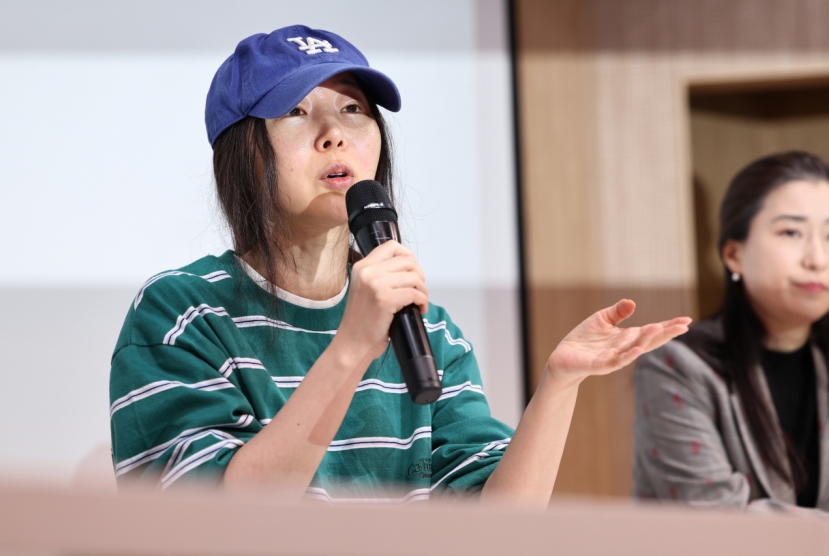[Herald Interview] Strong intellectual property protection critical for drug innovation
'Korean biotechnology firms well positioned to take next step'
By Kan Hyeong-wooPublished : Oct. 31, 2022 - 19:44

Strong intellectual property protection is a key factor for pharmaceutical and biotechnology firms to become global household names, according to a high-ranking official at the International Federation of Pharmaceutical Manufacturers and Associations.
“Because our industry is one of the most highly regulated industries, so what’s necessary in order to excel in that situation is, of course, the ability to innovate first and foremost. But that is only allowed through very strong intellectual property protection,” said Fumie Griego, deputy director general and chief operating officer at the IFPMA in an interview with The Korea Herald last week.
The IFPMA, based in Geneva, represents over 90 pharmaceutical companies and associations across the world, including most of the pharmaceutical powerhouses such as AbbVie, Johnson and Johnson, Novartis and Pfizer.
“Whether it’s the US, Europe or Japan, historically, the key IP protection and enablers are what allowed companies to deeply invest in R&D at risk. So being allowed to have that incentive for succeeding in the future through IP is a critical piece,” she added.
According to the Korea Health Industry Development Institute, it usually takes 10 to 15 years to develop a new drug and get regulatory approval. On top of that, only about 1 out of 5,000 to 10,000 drug candidates becomes a product.
Griego underscored the importance of a robust regulatory system for successful commercialization and pointed out the fact that different countries have built certain hubs to support and foster the pharmaceutical industry.
“Companies can only do what the ecosystem can deliver, so there’s a number of important policy dimensions to that,” she said.
The IFPMA official noted that the Korean government should be commended for putting efforts into promoting the country’s life sciences sector and laying the groundwork for an innovative ecosystem, adding that there is a reason multinational drug makers partner with Korea-based companies.
Regarding the Korean biotech industry’s outlook, Griego voiced high expectations but called for more incentives from the government.
“I think there are a number of companies who are very well positioned to take the next step. What will be critical moving forward is policy not only in Korea but globally that allows these companies to continue to invest in innovation, which would be (protecting) IP, as well as health policies that reward and incentivize new medicines,” she said.
“Because our industry is one of the most highly regulated industries, so what’s necessary in order to excel in that situation is, of course, the ability to innovate first and foremost. But that is only allowed through very strong intellectual property protection,” said Fumie Griego, deputy director general and chief operating officer at the IFPMA in an interview with The Korea Herald last week.
The IFPMA, based in Geneva, represents over 90 pharmaceutical companies and associations across the world, including most of the pharmaceutical powerhouses such as AbbVie, Johnson and Johnson, Novartis and Pfizer.
“Whether it’s the US, Europe or Japan, historically, the key IP protection and enablers are what allowed companies to deeply invest in R&D at risk. So being allowed to have that incentive for succeeding in the future through IP is a critical piece,” she added.
According to the Korea Health Industry Development Institute, it usually takes 10 to 15 years to develop a new drug and get regulatory approval. On top of that, only about 1 out of 5,000 to 10,000 drug candidates becomes a product.
Griego underscored the importance of a robust regulatory system for successful commercialization and pointed out the fact that different countries have built certain hubs to support and foster the pharmaceutical industry.
“Companies can only do what the ecosystem can deliver, so there’s a number of important policy dimensions to that,” she said.
The IFPMA official noted that the Korean government should be commended for putting efforts into promoting the country’s life sciences sector and laying the groundwork for an innovative ecosystem, adding that there is a reason multinational drug makers partner with Korea-based companies.
Regarding the Korean biotech industry’s outlook, Griego voiced high expectations but called for more incentives from the government.
“I think there are a number of companies who are very well positioned to take the next step. What will be critical moving forward is policy not only in Korea but globally that allows these companies to continue to invest in innovation, which would be (protecting) IP, as well as health policies that reward and incentivize new medicines,” she said.



![[Herald Interview] 'Amid aging population, Korea to invite more young professionals from overseas'](http://res.heraldm.com/phpwas/restmb_idxmake.php?idx=644&simg=/content/image/2024/04/24/20240424050844_0.jpg&u=20240424200058)
















